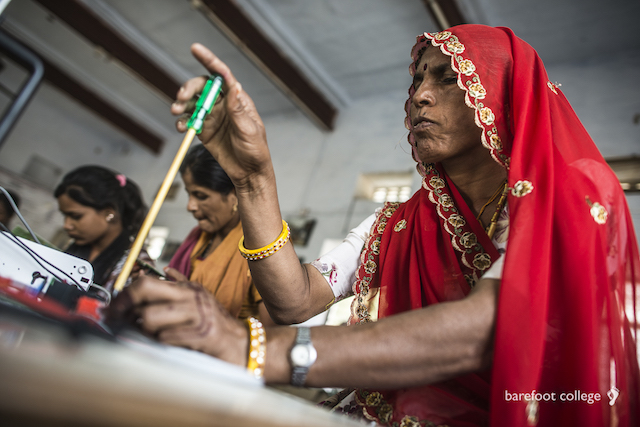Incredibly, 1.1 billion people – 14% of the world’s population – still live without access to electricity. In rural, remote communities, many people simply have no light after sunset. That makes being productive at night—such as working and learning–extremely difficult. Limiting useful hours of the day by access to daylight holds back personal and economic development and wastes human potential.
Many homes are forced to use kerosene lamps for illumination, which are environmentally dirty, and dangerous. Women are disproportionately at risk of inhaling low-quality kerosene smoke, especially while cooking. In fact, kerosene smoke is now one of the main killers of women in the developing world.
Bringing clean, renewable light to off-grid communities around the world
The Solar Mamas program, which has already improved tens of thousands of lives, is about bringing light – literally and metaphorically – to communities in Africa, Latin America, Asia and the Pacific Islands. The women who join the program are often illiterate or semi-literate mothers and grandmothers, who already play an important role in the development of their communities and are perfectly placed to introduce new ways of doing things.

The program is based around the idea that by investing in one woman, we can spread knowledge, skills and inspiration throughout a whole neighborhood. Solar Mamas trains women to build, install and maintain solar panels and batteries, so they can deliver clean energy to their villages. Participants also learn how to build LED lamps, charge controllers, lanterns and home lighting systems, and how to store and repair components. The equipment they construct is then shipped to their villages for installation. The training is entirely practical and requires no previous qualifications. Barefoot has also developed a training program using colors and pictures so the women can learn and work on the solar panels without needing the ability to reach and write.
After six months training with Barefoot College, Solar Mamas return home as trained solar engineers, able to install lighting and train others. Thanks to their work, children can read and write under clean light and adults can extend their working day, unlocking life-changing development and economic opportunities. Black carbon kerosene emissions are also reduced, helping developing countries reduce their climate footprint. The program is a perfect example of how a cross-sectoral partnership can create social change alongside clear, tangible business and economic benefits – generating lasting value for people who need it, advancing equality, giving women agency and helping them become businesspeople.
The UN SDGs depend on broad partnerships and collaboration
Barefoot College has been helping to address ultra-poverty for 45 years in almost 100 countries. Its interventions empower women from some of the most impoverished places in the world, contributing to multiple UN Sustainable Development Goals (SDGs). Solar Mamas contributes to several, including 1 – No poverty, 5 – Gender equality, 7 – Affordable and clean energy, 8 – Good jobs and economic growth and 13 – Climate action.
Flip the Switch – A Documentary introduces some of the Solar Mamas in Mexico, Belize, Guatemala, Zanzibar and India, showing how they use their knowledge to help their communities. It also highlights the vital role that business and nonprofit partnerships play in making strong and sustained progress toward the SDGs.
Solar Mamas is a catalyst for long-lasting, self-driven change. As well as delivering renewable light, Barefoot College offers participants entrepreneurial training, which many have used to launch crafting businesses that use their sewing skills. Others have set up companies selling honey and coffee.
Unlocking enormous economic opportunity
The program can have a dramatic positive impact on the fortunes of not just Solar Mamas, but their whole communities. Research by the World Bank shows that women in work invest around 90% of their earnings into their families and communities – compared to 35% for men. That means money earned by program graduates is likely to be spent locally and stay local – further driving local growth.
Beyond the social case for investing in women and girls, there is a clear and compelling economic one, too. By 2025, the advancement of women’s equality could add $12 trillion to world GDP
– roughly equivalent to the size of the Chinese economy.
Achieving tangible results
Hogan Lovells has partnered with Barefoot College to support Solar Mamas since 2016. To date, 384 women across 35 countries have qualified as Solar Mamas through our partnership. Our aim is to train 400 women by 2019, who will then be able to extend light to 20,000 homes, improving the lives of around 200,000 people.

Amy C. Roma is Partner in the Energy Practice Group at Hogan Lovells, where she focuses on nuclear power matters. Amy has broad experience with the commercial needs of businesses with nuclear or nuclear-related assets. This background enables her to help clients navigate the legal and commercial issues created by a global marketplace and emerging innovative technologies. Spearheading many “first of its kind” cutting-edge projects, Amy was recognized by the National Law Journal in April 2015 in the first edition of “Energy & Environmental Trailblazers,” a special supplement paying tribute to the top 50 “great minds impacting the crucial intersection of energy production and the environment.” A strong believer in community involvement, she is an active volunteer for a number of causes including providing support for the homeless and populations with cognitive and physical disabilities.




